- Blog
- How to Use AI in Digital Marketing: An Ultimate Guide for 2025
How to Use AI in Digital Marketing: An Ultimate Guide for 2025
-
Nikolett Lorincz
- Marketing
- 6 min read
Table of Contents
Artificial intelligence (AI) has quickly altered the digital marketing landscape as a tool for writing blog posts, handling customer inquiries, forecasting demand, and more.
Are you looking for ways to take your digital marketing strategy to the next level? AI could be the perfect solution to help you personalize your marketing efforts, optimize your content, and improve your ROI.
In this blog post, we’ll explore how you can use AI in digital marketing. We’ll also take a look at seven great AI marketing tools and go over how you can leverage them for your business.
So why wait? Let’s dive into the world of AI!
What is AI marketing?
AI marketing uses artificial intelligence to automatically make decisions based on collected data, analysis, and observations of audience behavior and economic trends.
This innovative method is transforming digital marketing by helping businesses work more efficiently and create personalized experiences like never before.
Why use AI in marketing?
AI has been a game-changer in almost every corner of the digital marketing world, from marketing automation to social media marketing and beyond.
Although AI technologies have been used in marketing strategies for more than a decade, the new generation of natural language processing tools like ChatGPT has brought AI tech into the limelight.
An AI marketing tool will generally use machine learning to understand and perform repetitive tasks like content generation for blogs or social media posts by analyzing large amounts of data.
Automating tasks like this can help increase your ROI by helping you work more efficiently and reach more potential customers.
Using AI in your marketing strategy can also help you improve the overall customer engagement.
An AI marketing tool can help you connect with your target audience by creating relevant content for each individual, which can help you boost both your conversion rate and your customer satisfaction.
7 use cases for using AI in your marketing strategy
Everyone from social media management teams to CRO experts and SEO marketers can use AI, whether it’s for simple task automation, collecting data, or coming up with creative ideas.
Here are seven popular use cases for using AI in your marketing strategy.
1. Brainstorming
You can harness the power of AI to enhance your creativity, efficiency, and strategic decision-making. AI-powered SaaS tools can be used to generate topic ideas, suggest keywords, and identify emerging trends, which ultimately drives impactful and data-driven marketing initiatives.
An AI model like ChatGPT can help you brainstorm article headlines and topics, or even come up with ideas for visualization.
All you need to do is type in a prompt like “Give me five ideas for blog posts about [your topic or niche].” AI won’t replace human creativity, but it can be a great assistant.
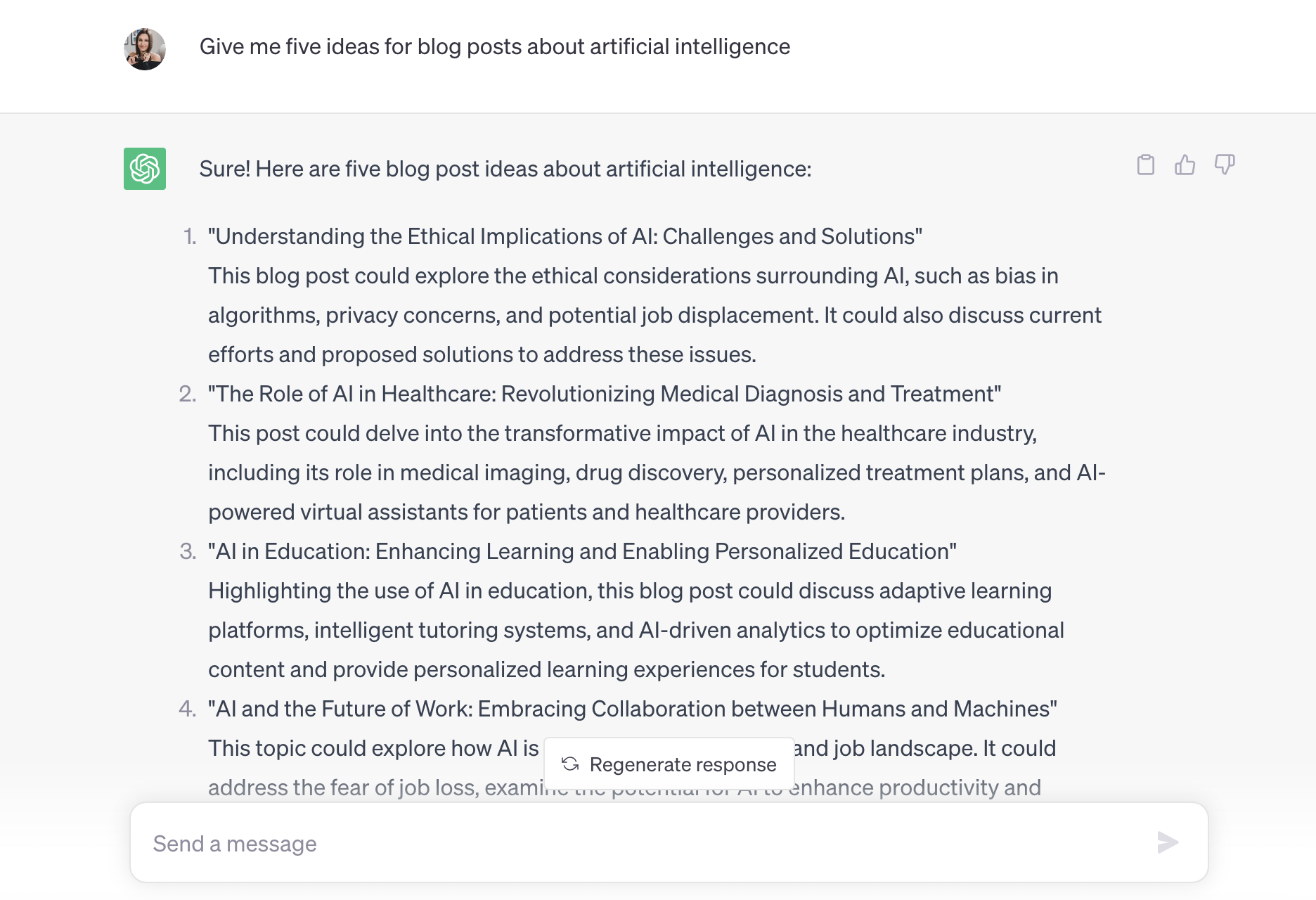
Most marketing automation software has integrated with ChatGPT to help you brainstorm ideas without ever leaving their platform.
OptiMonk’s Smart Headline Generator is a great example of this. It’s built into the drag & drop editor and it generates catchy headline ideas for your popups and embedded campaigns with just one click.
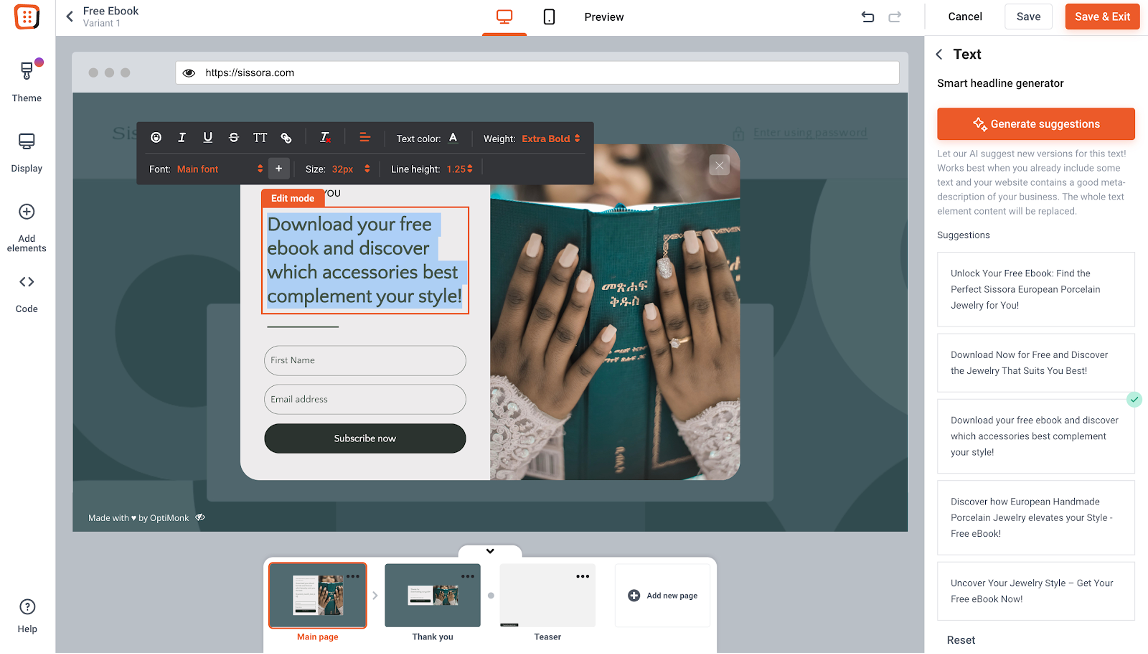
2. Research and customer data analysis
AI tools can analyze the performance of past campaigns and identify patterns of success, enabling you to develop more effective marketing strategies.
Since AI marketing can analyze consumer data from diverse sources (social media, market trends, consumer behavior, etc.) it’s able to deliver deep insights into the success of your marketing campaigns.
AI technology relies on high-quality data to develop customer profiles and optimize marketing campaigns. That’s why having access to a well-equipped customer data platform is a must for anyone who wants to get the most out of artificial intelligence.
AI tools can also assist in competitor analysis by automating data collection and data analysis. This could allow you to gain a competitive edge by uncovering competitor tactics, keywords, and market positioning.
3. Content creation
Using AI for content creation is probably one of the most popular applications of AI in marketing.
New AI tech like ChatGPT and HubSpot can perform complex tasks like providing content recommendations, suggesting headlines, writing your outlines, or even generating entire articles based on your topics and keywords.
AI can also assist in content optimization by analyzing user engagement and behavior, identifying areas for improvement, providing valuable insights, and suggesting strategies for enhancing your content marketing performance.
Using an AI writing tool in your content creation process will expedite your workflow by generating engaging content rapidly and at scale.
With AI, you can easily generate content for your article, e.g. an introduction.
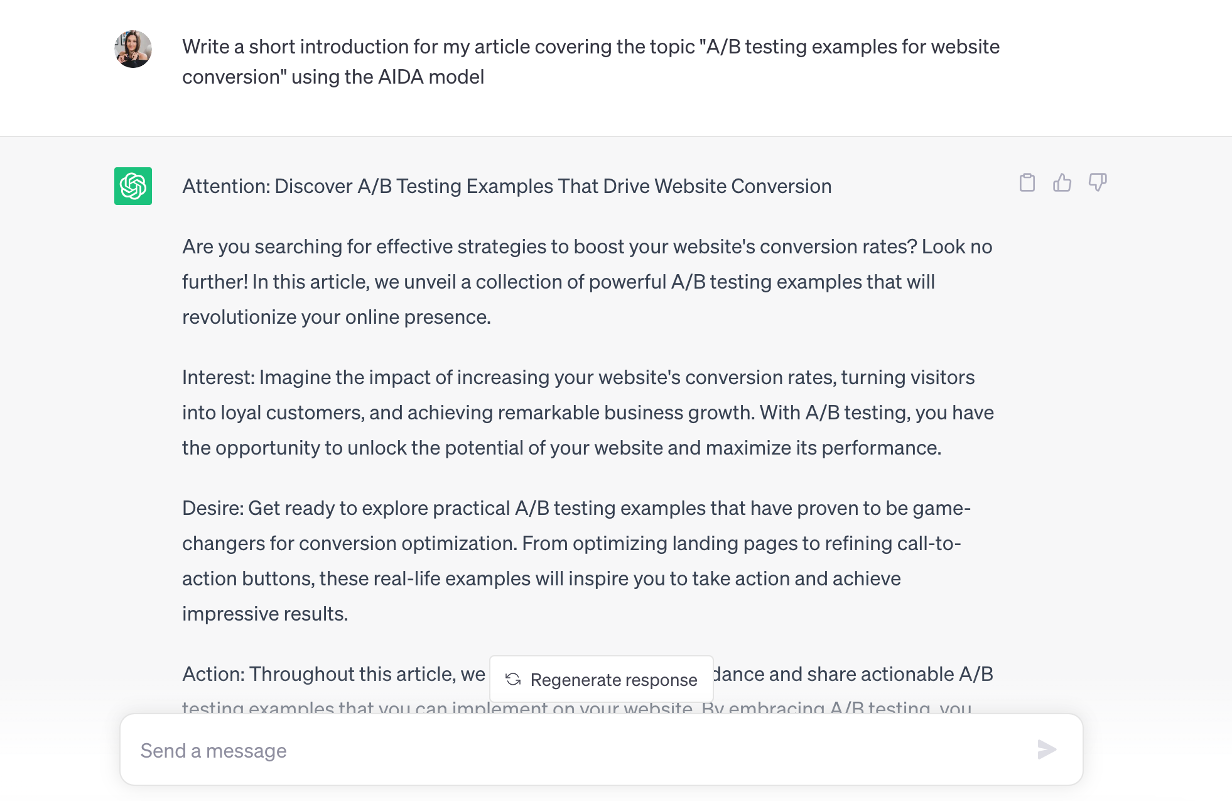
4. Reporting
Reporting is another popular way of using AI.
AI tools can help ensure you’re getting accurate data, allowing you to uncover meaningful patterns, trends, and insights. It can also generate comprehensive reports with visualizations. Whatever KPIs you’re using, an AI marketing tool can help you evaluate your web pages and social media presence.
Additionally, AI tools excel at identifying anomalies and areas that could use improvement, highlighting opportunities for optimization. This is great, because the more data you have and the better you analyze it, the better you’ll connect with your target audience.
5. Personalization
Consumers expect tailored experiences, especially in the realm of ecommerce.
1-to-1 personalization has been hard to achieve in the past, but with the help of AI-powered tools, it’s become much easier.
OptiMonk’s Smart Personalizer is at the forefront of this revolution, offering advanced features that empower ecommerce stores to deliver hyper-personalized experiences.
This tool uses the power of AI to match the messaging of your landing pages to your paid ads automatically, boosting relevancy and conversions.
You can effortlessly personalize hundreds of landing pages at once—with just a few clicks—and boost PPC conversion rates by up to 100%.
Here’s an example from Shoprenter. They used the Smart Personalizer to customize their homepage messaging for each keyword they target on Google Ads.
People who searched for “opening an online store” and clicked on Shoprenter’s ad saw the following message:
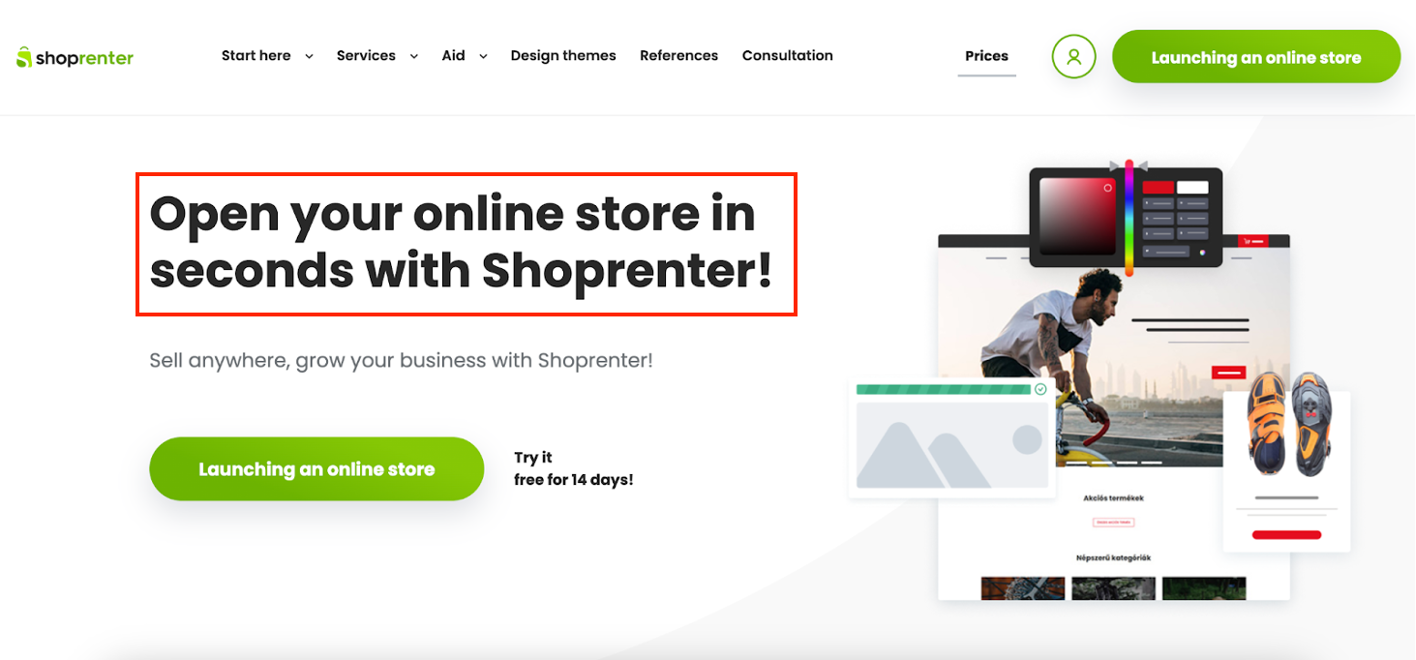
But those who were looking at an alternative by searching for the “shopify” keyword saw the following message:
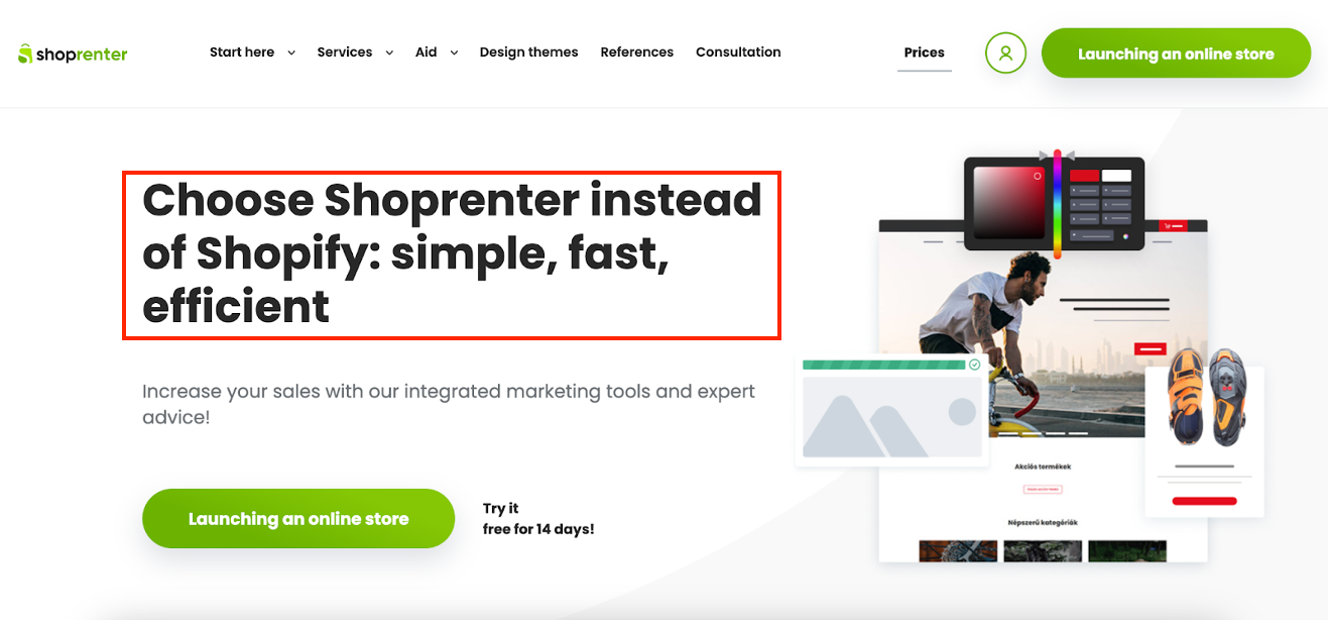
By automating this process, you can multiply the results of your paid ad campaigns, ensuring that visitors are greeted with a landing page that resonates with their individual interests.
You can also use AI to personalize your web page by offering customer-specific product recommendations and dynamic pricing. AI algorithms can deliver personalized recommendations in real-time, whether it’s on a website, through email marketing, or via personalized ads.
6. Mass optimization
Traditionally, optimizing product pages for higher conversion rates involved a time-consuming and resource-intensive process. However, with the advent of AI, businesses can now execute large-scale strategies that transcend the limitations of manual optimization.
The Smart Product Page Optimizer is a cutting-edge tool designed to revolutionize the way ecommerce stores approach conversion rate optimization. Here’s how this tool can elevate your optimization strategy while preserving the essence of human creativity:
- Decide what you want to optimize on your product pages and tell the AI with just a few clicks.
- Let the AI analyze your product pages and write headlines, benefit lists, and descriptions for all your products.
- Watch the magic unfold as the new elements are added to your product pages automatically. The AI will keep testing and optimizing these elements based on data.
This level of automation allows businesses to optimize hundreds of product pages simultaneously, saving time and resources while freeing up creative minds for more strategic endeavors.
Mounteen tried the Smart Product Page Optimizer, which helped them achieve an impressive 18% revenue boost. Here’s exactly what the tool optimized on their website:
- It added a bold, catchy slogan at the top of each product page to grab visitors’ attention.
- It created a clear, benefit-driven subheadline which was displayed below the slogan to showcase the value proposition.
- It highlighted the main product benefits with a bulleted list in the above-the-fold section so visitors could instantly see how the product addresses their challenges or enriches their lives.
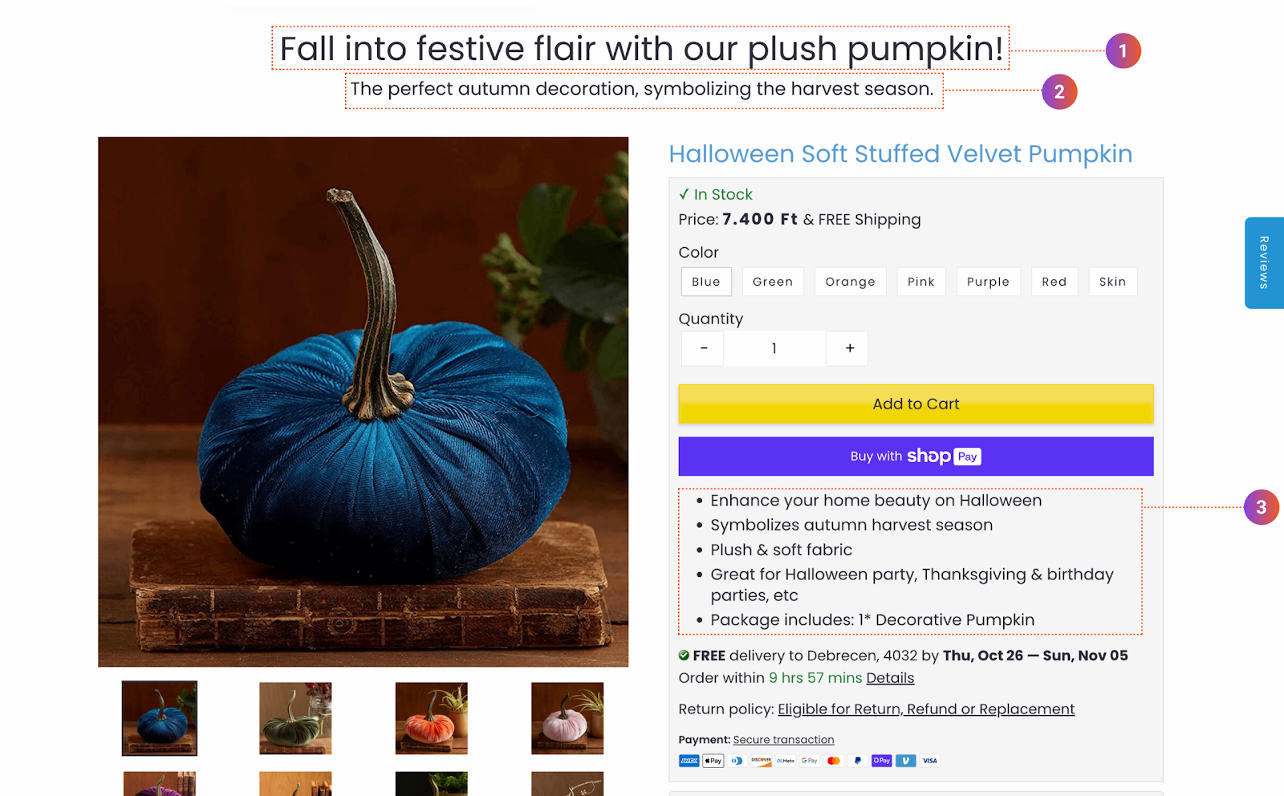
If you’d like to get started with mass product page optimization using the power of AI, try the Smart Product Page Optimizer now.
7. Improving customer experience
Finally, there are many cases of AI improving customer experience.
For example, chatbots can provide rapid customer support and accurate assistance around the clock on your website or on Facebook Messenger.
Many chatbots can also be programmed to hand a customer over to your customer service team when human expertise is needed.
Top 7 AI tools to improve your marketing efforts
Now that we’ve taken a look at how digital marketers are using AI, let’s check out some of the top AI tools on the market.
1. OptiMonk AI
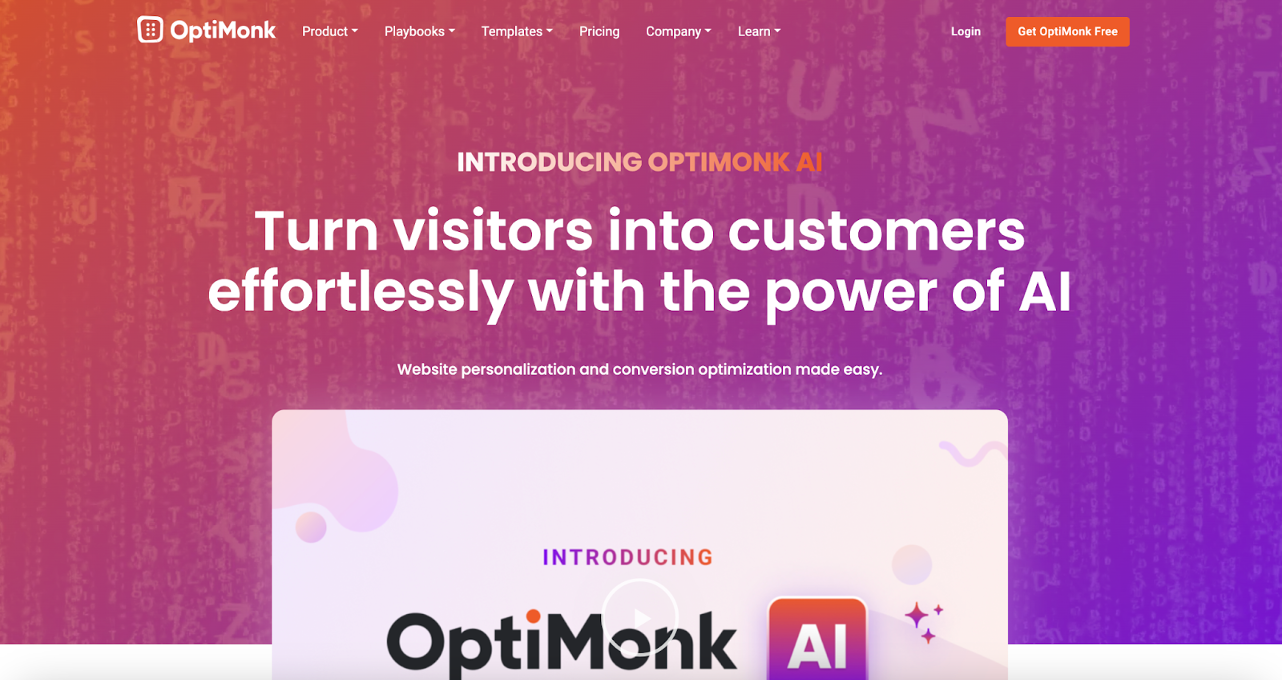
OptiMonk AI is an AI-powered CRO platform designed to automate processes like A/B testing and personalization to maximize your website conversions.
It’s built for marketers looking for new, data-driven ways to improve the efficiency of their marketing processes without having to hire a CRO team.
Key feature #1: Smart Personalizer
Smart Personalizer instantly makes your landing pages more personalized for each person who visits them. It does this by making sure the words on your landing page match the ads you’re running on Google.
This makes your landing pages more relevant and helps more people decide to take action, like buying something or signing up.
Key feature #2: Smart A/B Testing
Say goodbye to the old days of tedious, manual A/B testing. OptiMonk now provides completely automatic A/B testing with the help of AI.
With Smart A/B Testing, you can easily run many A/B tests at the same time on any part of your webpage. The best thing is that you decide which tests to run, and our AI takes care of the rest!
Key feature #3: Smart Product Page Optimizer
Our Smart Product Page Optimizer uses AI to transform product detail pages into highly effective sales pages by crafting persuasive copy.
Leverage AI’s ability to create captivating headlines, descriptions, and lists of benefits that connect with your audience. You can also conduct A/B tests on multiple product pages at once, simplifying the process and allowing you to customize ideal product pages for every item in your extensive inventory.
Want to try OptiMonk AI to optimize your website? Get a demo now!
2. Jasper
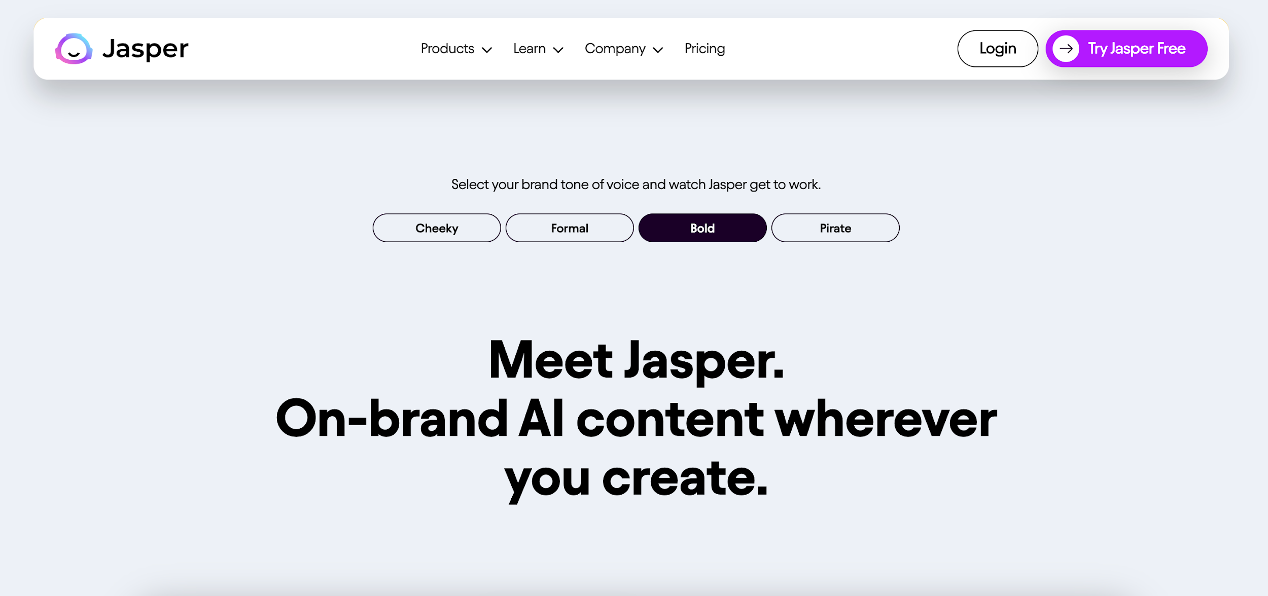
Jasper is a powerful tool that was specifically designed to assist with online marketing strategies. By analyzing a brand’s style guide and existing content, Jasper can generate copy and content written in a brand’s own voice.
This tool proves especially valuable in crafting content for paid search platform advertisements and landing pages.
Pricing: Starts at $49 per month.
3. ChatGPT Plus (GPT-4)
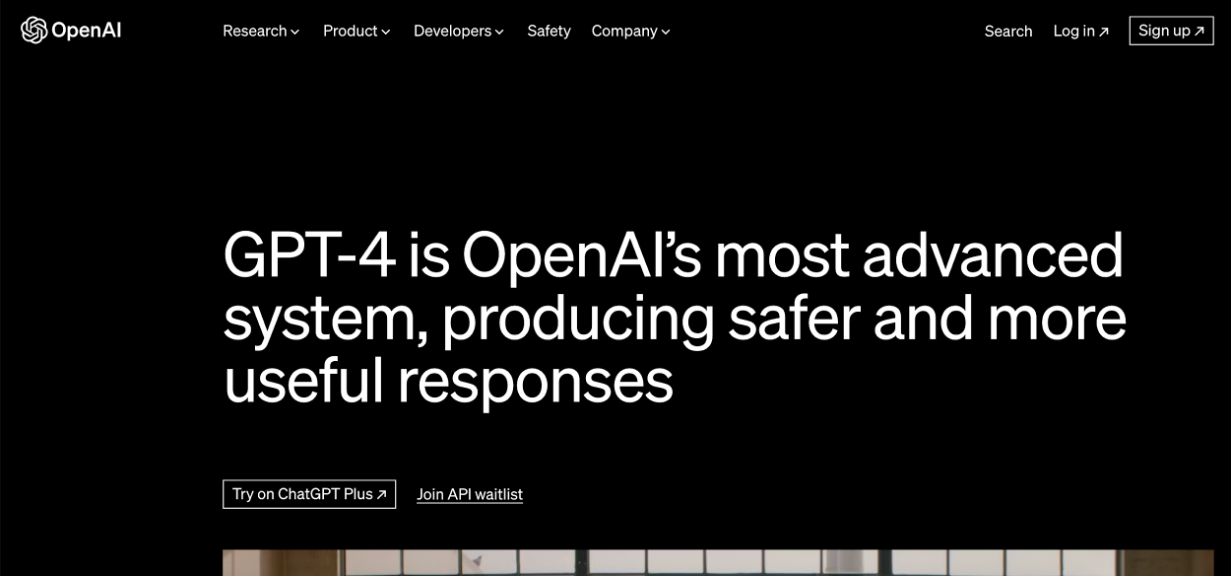
ChatGPT Plus is an advanced natural language AI tool that’s used for online marketing applications like content writing. Its flexibility means it can perform tasks such as natural language understanding, sentiment analysis, and customer behavior prediction.
ChatGPT Plus makes it possible to create personalized experiences for all your visitors, resulting in increased customer satisfaction and experiences.
Pricing: $20 per month.
4. ElevenLabs
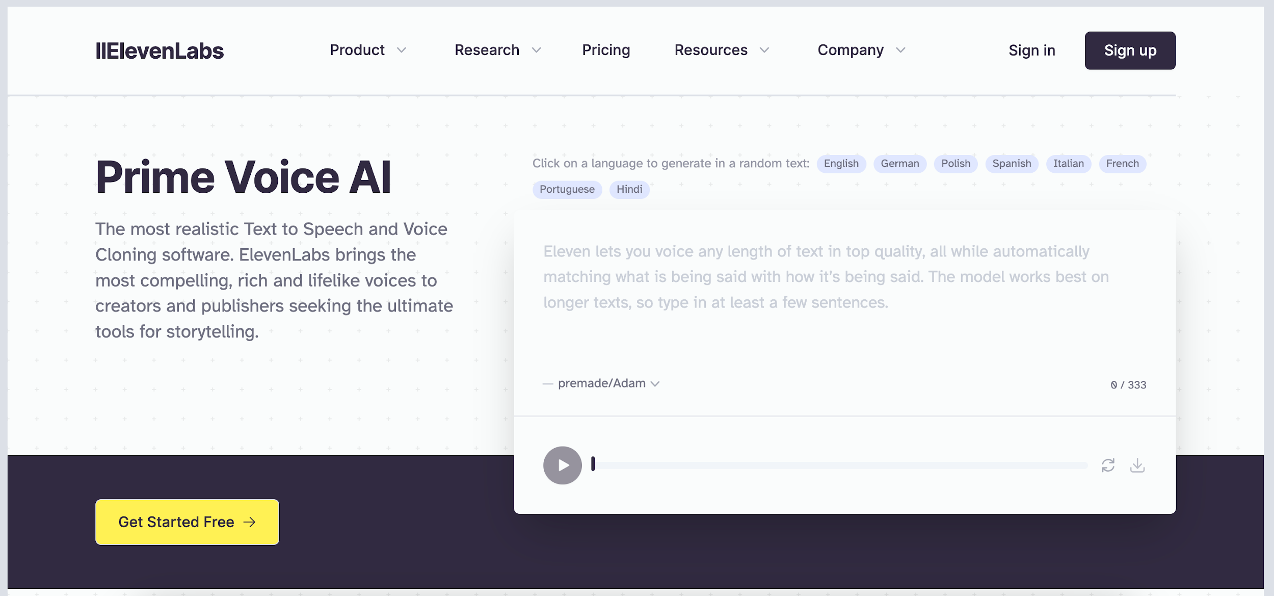
ElevenLabs is a new marketing software that allows marketers to create voiceovers and other audio content based on text to speech technology. It’s an excellent tool for any online business that focuses on video marketing or podcasting/audiobooks.
Pricing: Free, or from $8 per month for a starter plan.
5. Opus Clip
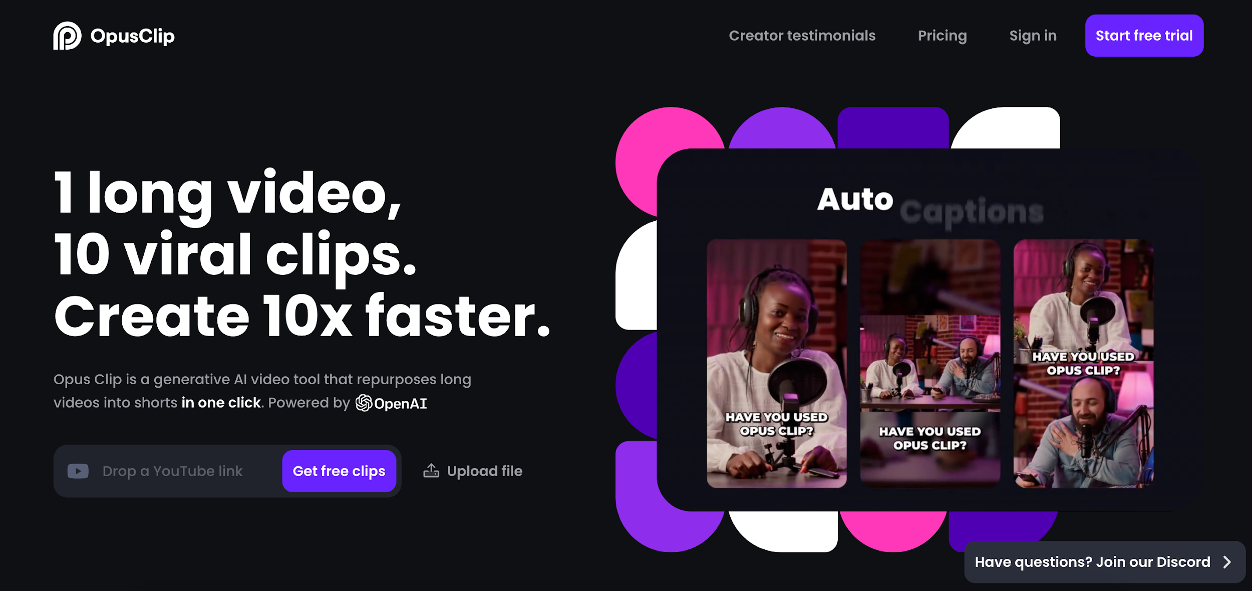
Opus Clip is a versatile AI tool designed for online marketing professionals, offering advanced video creation and editing capabilities. With Opus Clip, marketers can easily create engaging professional videos for social media campaigns, ads, and website content.
The tool’s AI features enable automatic video editing, captioning, and customization, saving time and effort in the production process.
Pricing: Starts at $19.99 per month.
6. SmartWriter
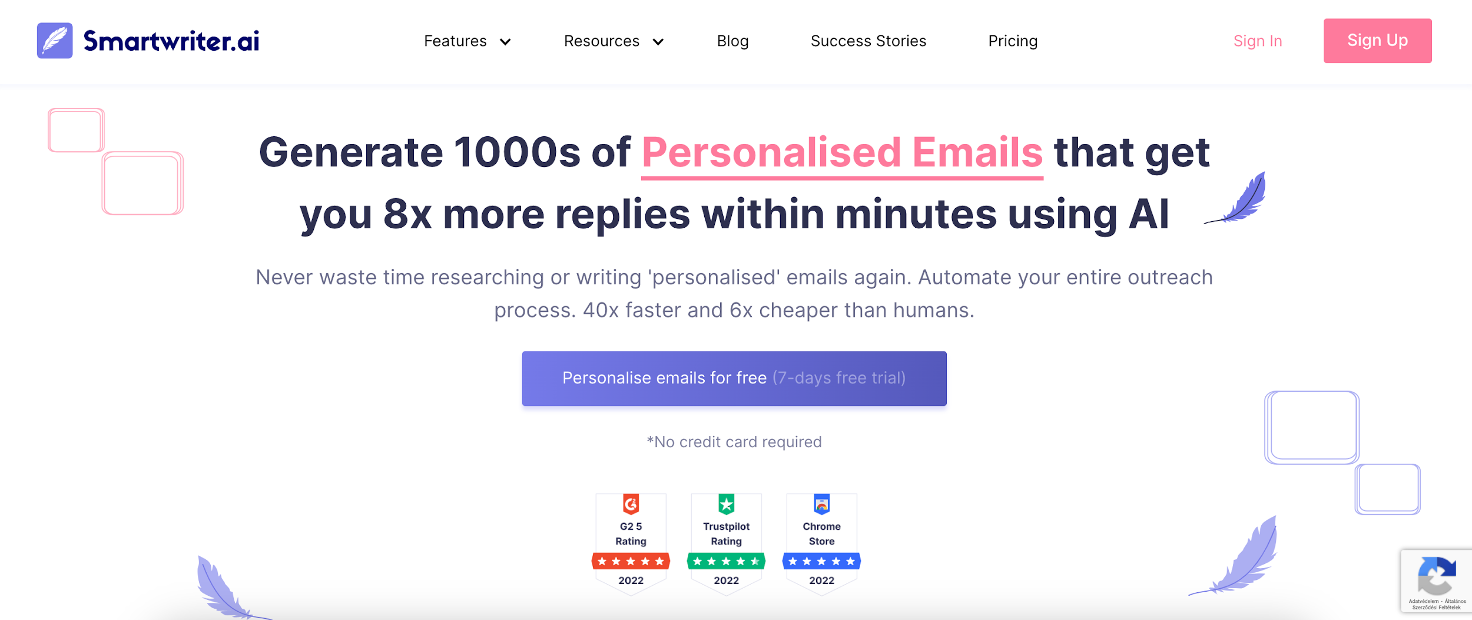
SmartWriter, another AI-powered tool, is specifically designed to enhance online marketing endeavors by delivering exceptional personalized emails. SmartWriter generates cold outreach emails by researching prospects’ online data to create highly personalized emails that push recipients to take action, allowing marketers to save valuable time and effort.
Pricing: Starts at $49 per month for the basic plan.
7. Grammarly
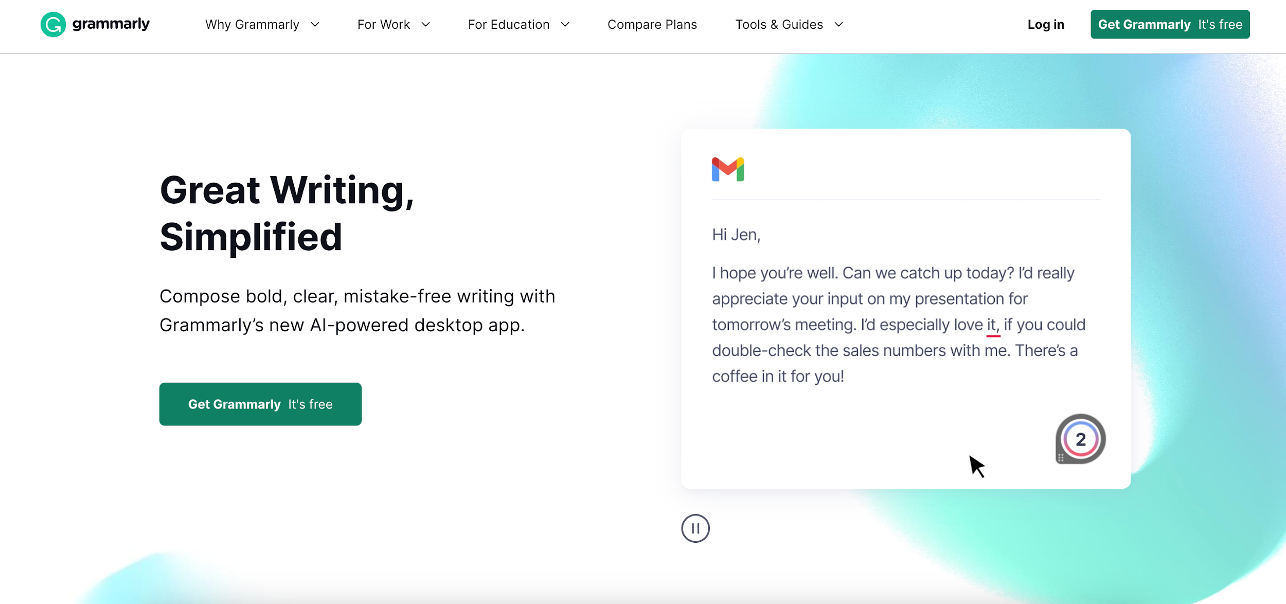
Grammarly is widely recognized as a valuable tool for online marketing, helping digital marketers create clean, error-free content. It provides real-time checks for grammar and spelling, along with suggestions to enhance clarity and conciseness.
With core features like tone detection and plagiarism checking, Grammarly allows marketers to keep a consistent, professional tone across all communication channels.
Pricing: Free plan available. Paid packages start at $29.95 per month.
What are the pros and cons of using AI for your marketing campaigns?
By considering both the positive and negative aspects, you can better understand the implications of using AI to improve your marketing efforts.
Pros:
- Increased productivity: Marketing teams can use AI to automate various tasks, freeing up time and effort.
- Enhanced efficiency: Repetitive activities such as data input can be handled by AI algorithms, resulting in improved efficiency.
- Data-driven insights: By eliminating guesswork, AI provides data-driven capabilities that enable marketing teams to develop more effective strategies.
- Content creation and optimization: AI-powered content generators can automate content generation ensuring the production of high-quality content at scale.
- Personalization at scale: Through the analysis of customer data, AI can generate personalized recommendations or content, thereby enhancing the overall customer experience.
- Predictive analysis: AI systems can forecast consumer behavior and market trends based on historical data, allowing for more accurate planning and decision-making.
- Task automation: Routine tasks like data analysis, customer segmentation, email sorting, data entry, and basic reporting can be efficiently handled by AI, reducing manual labor.
Cons:
- Bias: AI-driven digital marketing heavily relies on the data they are trained on, making them susceptible to inherent biases, including but not limited to racial, gender, cultural, or socioeconomic biases.
- Inaccuracy: Mistakes or inaccuracies in the data provided to AI systems can lead to faulty analyses, which may result in costly business decisions.
- Ethical concerns: Issues related to the manipulation of user data and behavior, consent, and the intrusive nature of hyper-targeted advertisements arise with the use of digital marketing AI.
- Data sensitivity and security: AI in digital marketing typically requires access to extensive datasets, which may contain sensitive information.
- Transparency: The prevalence of AI-generated content raises questions about transparency, plagiarism, authorship, and intellectual property ownership, which need to be addressed responsibly.
FAQ
How is AI changing the marketing industry?
AI is significantly transforming the marketing industry by revolutionizing the way that businesses reach and engage with their customers. By analyzing hundreds of thousands or millions of data points, AI marketing tools offer valuable insights into consumer behavior, preferences, and trends. All of this means that AI marketing can drive highly personalized, targeted campaigns.
What career opportunities are available for marketers leveraging AI?
Marketers who understand and master AI can unlock a range of career opportunities. Companies are actively seeking marketers with AI skills and innovative thinking. By mastering AI, marketers gain valuable skills and experience in a technology that is becoming increasingly prevalent, positioning themselves as valuable assets for recruitment.
Why is AI the future of marketing?
AI stands out as a pivotal force in the future of marketing. Its capacity to analyze vast amounts of data and generate actionable insights allows businesses to engage with consumers more effectively and at a personalized level that was previously unattainable. By automating routine tasks and optimizing your digital marketing efforts, AI reduces labor costs and minimizes wasted ad spend. It also improves the ROI for marketing campaigns, ensuring that marketing budgets are used more effectively.
Wrapping up
AI is making waves in the world of marketing. To stay on top of the game, it’s crucial to keep an eye on emerging trends and keep experimenting with new AI solutions as they become available.
By incorporating AI into your marketing strategies in ways that make sense for your business, you’ll be able to improve efficiency, ROI, and customer experiences.
Migration has never been easier
We made switching a no-brainer with our free, white-glove onboarding service so you can get started in the blink of an eye.
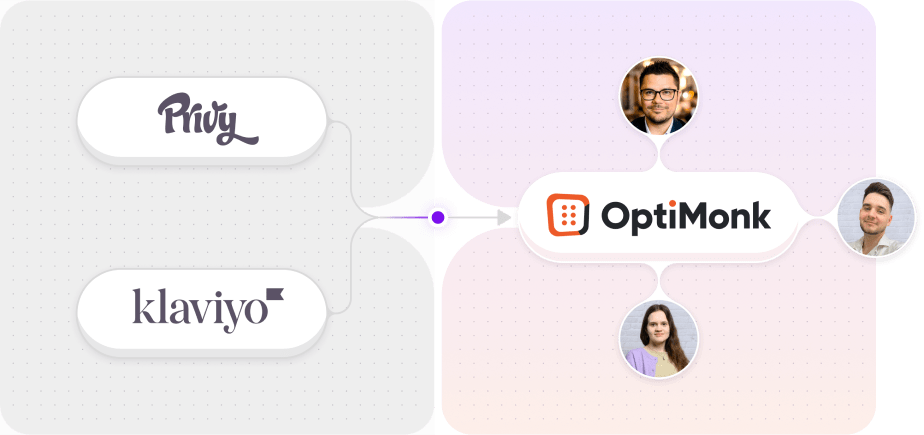
What should you do next?
Thanks for reading till the end. Here are 4 ways we can help you grow your business:
Boost conversions with proven use cases
Explore our Use Case Library, filled with actionable personalization examples and step-by-step guides to unlock your website's full potential. Check out Use Case Library
Create a free OptiMonk account
Create a free OptiMonk account and easily get started with popups and conversion rate optimization. Get OptiMonk free
Get advice from a CRO expert
Schedule a personalized discovery call with one of our experts to explore how OptiMonk can help you grow your business. Book a demo
Join our weekly newsletter
Real CRO insights & marketing tips. No fluff. Straight to your inbox. Subscribe now
Nikolett Lorincz
- Posted in
- Marketing
Partner with us
- © OptiMonk. All rights reserved!
- Terms of Use
- Privacy Policy
- Cookie Policy
Product updates: January Release 2025








